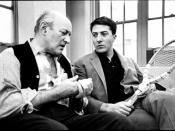Arthur Miller's Death of a Salesman can be seen as an eulogy of a dreamer, which depicts one man's tragic life and death as he tries to bring his family into grace. Miller does, however, also uses this play to express underlying themes and ideas. Reading Death of a Salesman from the starting point of a Marxist results in the perception that miller uses his play as a means to demonstrate the effects of a changing capitalist society. On the other hand, a psychological reading of Death of a Salesman allows the play to be seen as one mans flight from shame and his own weakened self image. The Marxist perspective is a viable reading of this drama but it does not truly define it as a tragedy. To better understand this piece of literature as a tragedy one should observe the psychological reading which depicts the tragedy of one man.
Many people wonder if Willy is really responsible for his own death, or is he, as Luke Carrol put it in the Herald Tribune, ' a pathetic little man caught in an undertow that's too strong for him.' Willy Loman is bewildered by a capitalist system which drives it's men into frantic, all consuming dreams of success, doomed not only by their grandiosity but also their inherent contradictoriness.
Willy's dreams of success are rooted in the concept of the 'American Dream', which is the
Koch 2
idea that this is a land of unlimited opportunity in which any ragamuffin can attain riches and any mother's son can become president (Hadomi 159). This concept of success is personified by two characters in the play: David Singleman and Ben Loman. The first an old sales man, David Singleman, who could travel anywhere and place many order by phone in his hotel...



Excellent essay
excellent essay. good connection to the american dream and Willy's pursuit of it.
3 out of 3 people found this comment useful.